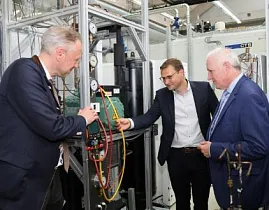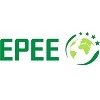
Market news, 25 July 2024
 Circular Economy underpinning the design and manufacturing of HVACR products
The heating and cooling sector has provided a significant contribution to a circular economy through the design and manufacturing of innovative products that actively seek to reduce resource use. Due to their specificities and existing legislation (e.g. Ecodesign, RoHS, WEEE), heating and cooling products already comply with circular economy principles across their whole lifecycle:
- The cost and availability of materials in itself is already a driver for resource efficiency and a key imperative for manufacturers when designing products to cut costs and eliminate waste.
- At the end of their life, heating and cooling products are not allowed to be disposed of by consumers directly, but rather by professionals and installers that ensure proper handling of all materials. Information on how to proceed is already available to professionals as part of existing Ecodesign requirements.
- In the context of Extended Producer Responsibility (EPR), manufacturers have also improved end-of-life recycling techniques that enhance material recovery.
Allowing spare parts on the market, for product repair
The availability of spare parts for maintenance and repair brings significant environmental benefits as it guarantees longer product lifetimes and prevents waste generation, which is one of the core elements of the EU’s resource efficiency policy and the EU waste hierarchy. It is also crucial that spare parts are available for refurbishment and remanufacturing.
Several products targeted by Ecodesign measures have a lifetime of at least 15 years. They should be repairable by ensuring that original spare parts are available during their lifetime. However, enforcing evolving Ecodesign requirements also on replacement parts or implementing the cascading principle (i.e. setting requirements for components such as fans, motors, circulatorsintegrated into products that
are already themselves covered by ecodesign measures) represents a significant risk for the availability of original spare parts because the replacement parts might be incompatible with the already installed products: as a consequence, a perfectly repairable product might thus need to be replaced before the end of its lifetime. This would be detrimental to the environment and in full contradiction with the principle of resource efficiency.
A number of regulations already address resource efficiency and extending the Ecodesign framework to spare parts thus runs the risk of legislative inconsistencies and unnecessary complexity, which needs to be avoided in view of “better regulation”.
Recommendation: In order to promote resource efficiency as of now, it is key that EU product policy rules allow original spare parts on the market during the lifetime of the products they are integrated into (“repair as produced” principle).
Promoting a transparent, robust and product-specific approach
For heating and cooling products, Ecodesign measures have been effective because they have regulated measurable, verifiable parameters of the whole products, such as the energy consumption in use on the basis of a clear and transparent methodology. To drive forward the Circular Economy agenda, this approach needs to be maintained across the EU Product Policy Framework to transform the market, taking into account the specificities of the various product groups.
Recommendation: Resource efficiency requirements should be considered when reliable, reproducible, and enforceable standards to measure them exist. Moreover, they should be based on a thorough impact assessment taking into account the specificities of product groups.
Circular Economy underpinning the design and manufacturing of HVACR products
The heating and cooling sector has provided a significant contribution to a circular economy through the design and manufacturing of innovative products that actively seek to reduce resource use. Due to their specificities and existing legislation (e.g. Ecodesign, RoHS, WEEE), heating and cooling products already comply with circular economy principles across their whole lifecycle:
- The cost and availability of materials in itself is already a driver for resource efficiency and a key imperative for manufacturers when designing products to cut costs and eliminate waste.
- At the end of their life, heating and cooling products are not allowed to be disposed of by consumers directly, but rather by professionals and installers that ensure proper handling of all materials. Information on how to proceed is already available to professionals as part of existing Ecodesign requirements.
- In the context of Extended Producer Responsibility (EPR), manufacturers have also improved end-of-life recycling techniques that enhance material recovery.
Allowing spare parts on the market, for product repair
The availability of spare parts for maintenance and repair brings significant environmental benefits as it guarantees longer product lifetimes and prevents waste generation, which is one of the core elements of the EU’s resource efficiency policy and the EU waste hierarchy. It is also crucial that spare parts are available for refurbishment and remanufacturing.
Several products targeted by Ecodesign measures have a lifetime of at least 15 years. They should be repairable by ensuring that original spare parts are available during their lifetime. However, enforcing evolving Ecodesign requirements also on replacement parts or implementing the cascading principle (i.e. setting requirements for components such as fans, motors, circulatorsintegrated into products that
are already themselves covered by ecodesign measures) represents a significant risk for the availability of original spare parts because the replacement parts might be incompatible with the already installed products: as a consequence, a perfectly repairable product might thus need to be replaced before the end of its lifetime. This would be detrimental to the environment and in full contradiction with the principle of resource efficiency.
A number of regulations already address resource efficiency and extending the Ecodesign framework to spare parts thus runs the risk of legislative inconsistencies and unnecessary complexity, which needs to be avoided in view of “better regulation”.
Recommendation: In order to promote resource efficiency as of now, it is key that EU product policy rules allow original spare parts on the market during the lifetime of the products they are integrated into (“repair as produced” principle).
Promoting a transparent, robust and product-specific approach
For heating and cooling products, Ecodesign measures have been effective because they have regulated measurable, verifiable parameters of the whole products, such as the energy consumption in use on the basis of a clear and transparent methodology. To drive forward the Circular Economy agenda, this approach needs to be maintained across the EU Product Policy Framework to transform the market, taking into account the specificities of the various product groups.
Recommendation: Resource efficiency requirements should be considered when reliable, reproducible, and enforceable standards to measure them exist. Moreover, they should be based on a thorough impact assessment taking into account the specificities of product groups.